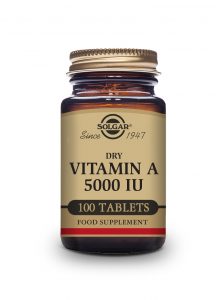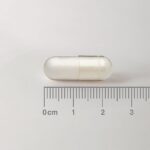





Vitamin A 5000 IU Dry 100Tablets Solgar
£15.00 Original price was: £15.00.£11.99Current price is: £11.99.
Vitamin A 5000
Solgar Vitamin A is an essential fat-soluble vitamin that plays a crucial role in various physiological functions throughout the body. Here are some of its key benefits:
1. **Vision Health:**
– Vitamin-A is essential for maintaining healthy vision, particularly in low-light conditions. It is a component of rhodopsin, a protein in the retina that helps the eyes adapt to darkness. Adequate vitamin A intake is necessary for night vision and overall eye health.
2. **Immune Function:**
– Vitamin A is important for supporting the immune system and promoting immune responses to infections. It helps maintain the integrity of mucosal surfaces, such as the lining of the respiratory and gastrointestinal tracts, which act as barriers against pathogens.
3. **Skin Health:**
– Vitamin-A plays a role in skin health and is essential for maintaining the integrity and function of the skin barrier. It supports the growth and differentiation of skin cells, helps regulate sebum production, and may aid in the treatment of certain skin conditions, such as acne and psoriasis.
4. **Cell Growth and Differentiation:**
– Vitamin-A is involved in cell growth, proliferation, and differentiation. It regulates gene expression and helps cells mature into specialized tissues. This process is important for normal development, tissue repair, and overall growth.
5. **Reproductive Health:**
– Vitamin-A is necessary for normal reproductive function in both males and females. It plays a role in sperm production, fetal development, and the maintenance of reproductive tissues.
6. **Bone Health:**
– Vitamin-A contributes to bone health by supporting bone growth and remodeling processes. It helps regulate osteoclast and osteoblast activity, which are involved in bone resorption and formation, respectively.
7. **Antioxidant Activity:**
– Vitamin A has antioxidant properties, helping to neutralize harmful free radicals and reduce oxidative stress in the body. This antioxidant activity may help protect cells and tissues from damage caused by reactive oxygen species.
8. **Healthy Teeth and Gums:**
– Vitamin A is important for maintaining the health of teeth and gums. It supports the growth and maintenance of dental tissues and helps prevent oral infections.
9. **Cancer Prevention:**
– Some studies suggest that adequate intake of vitamin A may help reduce the risk of certain types of cancer, particularly those of the lung, bladder, and prostate. Its antioxidant properties may play a role in protecting against cancer development.
10. **Wound Healing:**
– Vitamin A is involved in the process of wound healing, helping to repair damaged tissues and promote tissue regeneration. It supports the formation of collagen, a protein essential for wound closure and scar formation.
While vitamin A offers numerous health benefits, it’s important to consume it in appropriate amounts, as excessive intake can be harmful.
Most people can meet their vitamin A needs through a balanced diet that includes sources such as liver, fish oil, dairy products, eggs, and colorful fruits and vegetables rich in beta-carotene, a precursor to vitamin A.
If you’re considering vitamin A supplements, it’s advisable to consult with a healthcare professional to determine the appropriate dosage for your individual needs.
Vitamin A Foods
- Cod liver oil.
- Eggs.
- Fortified breakfast cereals.
- Fortified skim milk.
- Orange and yellow vegetables and fruits.
- Other sources of beta-carotene such as broccoli, spinach, and most dark green, leafy vegetables.
Vitamin A in the retinol form can take in cheese, eggs, oily fish, dairy products and liver. The beta carotene variant exists in green leafy vegetables, yellow vegetables and yellow and orange coloured non-citrus fruits.
Several of the body’s systems are dependent on sufficient levels of A. It comes into play with wound healing and skin regrowth as it supports the epithelial skin cells and production of keratin.
- Normal iron metabolism
- Maintenance of normal mucous membranes
- Maintenance of normal skin
- Improve of normal vision
- Normal function of the immune system
- Process of cell specialisation
- Bulking Agents: (dicalcium phosphate, microcrystalline cellulose, sucrose, gum arabic, corn starch), Vitamin C (as L-Ascorbic acid).
- Anti-caking Agents: (vegetable magnesium stearate, silicon dioxide), Cellulose Gum, Vitamin A (5000 IU, as retinyl palmitate).



















Reviews
There are no reviews yet.